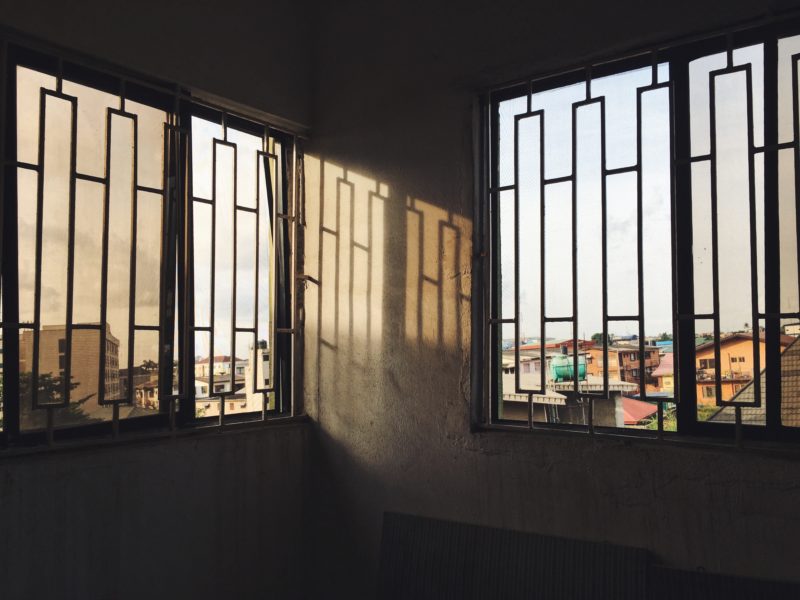Before I moved to Lagos, I hadn’t lived anywhere for five years. Kind of. I had a stint in Philadelphia. I lived first in my boyfriend’s home, an apartment he prepared for me carefully, buying pure cranberry juice before my arrival. We devolved. There were tears on a cracked sidewalk as cockroaches skittered by. I moved out. First onto a couch, and then to a dark blue room where I slept on a mattress on the floor. It was a study when I crashed there, but I have always been a nomad who carves homes out of emptiness.
I brush over this foray in America because it feels so disjointed from my life, but maybe it’s like all the other chapters: short, intense, lived with an eye to the ending, always halfway-elsewhere.
The home I count as my last before Lagos was in Port-au-Prince. The apartment was a storage space, but I begged my landlord to clear it for me. It was basically a foyer, round and windowless, with a table so squat I sat on the floor. I paid $250 a month for it and I mostly wasn’t there.
Between Port-au-Prince and Lagos, I cycled through reporting projects in Bihar, Achham, Guerrero, Nassau, Santo Domingo, Addis Ababa, Havana, and elsewhere. I rented rooms in a mud-brick farmhouse and a lakefront luxury hotel and a casa particular. In between, I would crash or sublet somewhere to write my stories: the Catskills or Chinatown or a bungalow by the Caribbean Sea. Can I live here? I would ask myself. The answer was no, no, no, no, no.
But I had a feeling about Lagos. Resonance: something rhythmic and energetic; something irretrievably interwoven with the physicality of the place, but other, supra-rational. “Cities are this, stone made suddenly alive by our emotions, by our desires,” Italian novelist Elena Ferrante has written. “We ought only to write about places we are in love with,” I have said. I think this is the place, I felt, as I held this warmth in my chest like a secret, like a romance, amidst the quaking of generators and light pollution reflecting against smoggy clouds.
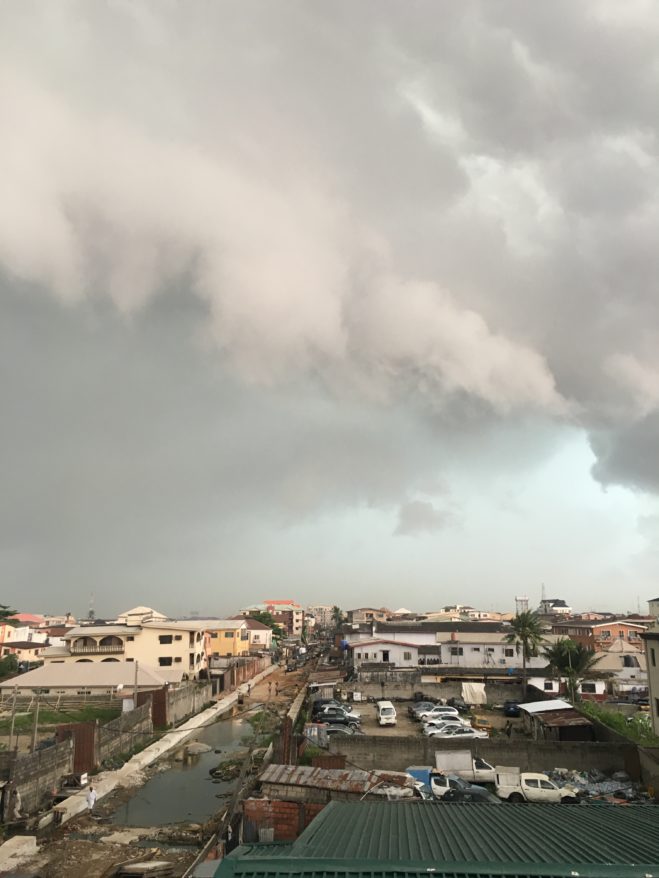
The city has crooked geometry: incoherent architectural choices and tilted foundations on land reclaimed with sand fill or hand-packed layers of garbage speckled like confetti. Surrounded by water, the city spreads down peninsulas like tentacles, and bulges over its borders. It is a city-state, really, and it long has been. Lagos was formerly the capital of Nigeria, and in the colonial era Lagosians had special privileges the rest of Nigerians didn’t. Ego accompanies the city’s cosmopolitanism. Street fashion is impeccable. The city is the cultural hub of the region, the New York of West Africa, home to a complex social tapestry of beliefs and identities.
When I moved here, after everywhere else, I was tired. I wanted home. I wanted a base. I wanted solidity. I wanted to find everything I needed in one place, and I thought Lagos had it: endless questions about humanity, complex stories, a flourishing art scene.
I shipped things I’d had in storage for years: my photographs, two hundred pounds of books. I had a writing fellowship that dictated I could not travel, which was a terrible fit. The second month, I was invited to a conference in Oxford and begged my bosses to let me go. My visa only permitted me to stay in the country for two months at a time, so I had to drive west to Benin Republic to re-stamp my passport. I could have tried harder to get a visa that let me stay more stably, but I liked the excuse to move.
It took a year and a half to find my home in Lagos. It was the sixth place I lived in the city. I stayed way out in the outskirts, in one of the many monotonous concrete housing estates. I lived down the street from the US embassy, in an odd bubble of comfort that made me feel like I entered and left the city every time I entered and left the house. I slept on a spare bed in the gym of a friend’s parents’ gaudy McMansion, beneath a florid winding staircase and an atrium crammed with gold-dusted vases.
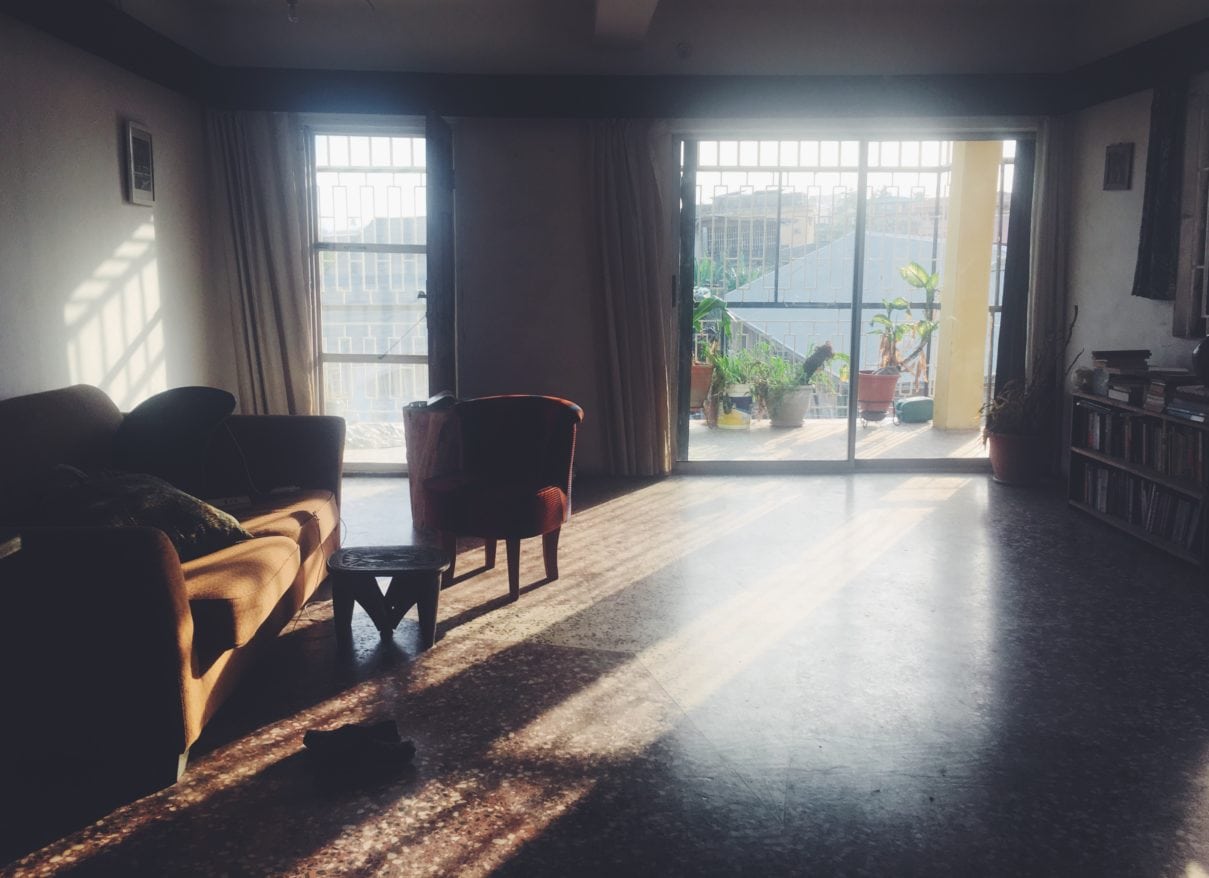
Finally, I found my space in Yaba. It spans the top floor of a four story apartment block. It was built in the eighties and is a spacious, tropical-modernist box of a place. Wide windows allow cross-ventilation; there is a wraparound balcony with a distant view of the lagoon and a closer view of an accidental manmade lake. The street is slated to be paved, but they built the gutters first, a meter above ground level. All the water pools in the middle of the road, and for months now, in order to leave the compound, I slip down a wooden beam. Egrets linger in the standing water, and children skip on half-submerged tires to cross the street.
The block is speckled with mosques and churches and traditional shrines, so I am serenaded on Sunday mornings, and called to prayer at sunset. The doormat reads, “You Are Blessed As You Enter.” People sing in Nigeria: in public, to themselves, to their lovers. Someone in my building has gospel dreams, so she joins too. Her songs mingle with the clang of gates closing, the banging of semi-detached roofs, the rhythmic clacking of shoe repairmen who announce their transitory business with a specific and repeated line of percussion. The neighborhood is living and breathing and moving, and my home is floating just above it—close enough to feel the place, to have one finger on reality, but high enough to have space for my thoughts to fly.
In my office, I feel suspended. I have a vintage geometric desk I found in an old colonial building, while reporting on Lagos’ architectural history and gentrification. I keep the books I am thinking about on the table, but I don’t allow a bookshelf in there. The office has to feel clean. Three huge windows filter in the air, the sounds, and the rain, which has stained soft black traces on the walls. When I was a child, home felt cold, lonely, and dark. I found peace anywhere else. I spent hours after school spinning complex character portraits of fantasy families as I danced around the garden of my father’s church, alone. I think that’s why my home is so airy. It is a space for structured dissociation. (Is that not what writing is?) At the far corner of the flat, I can shut the door and feel no one. The outside world drowns the inside world, and I feel safe, expansive, and alone.
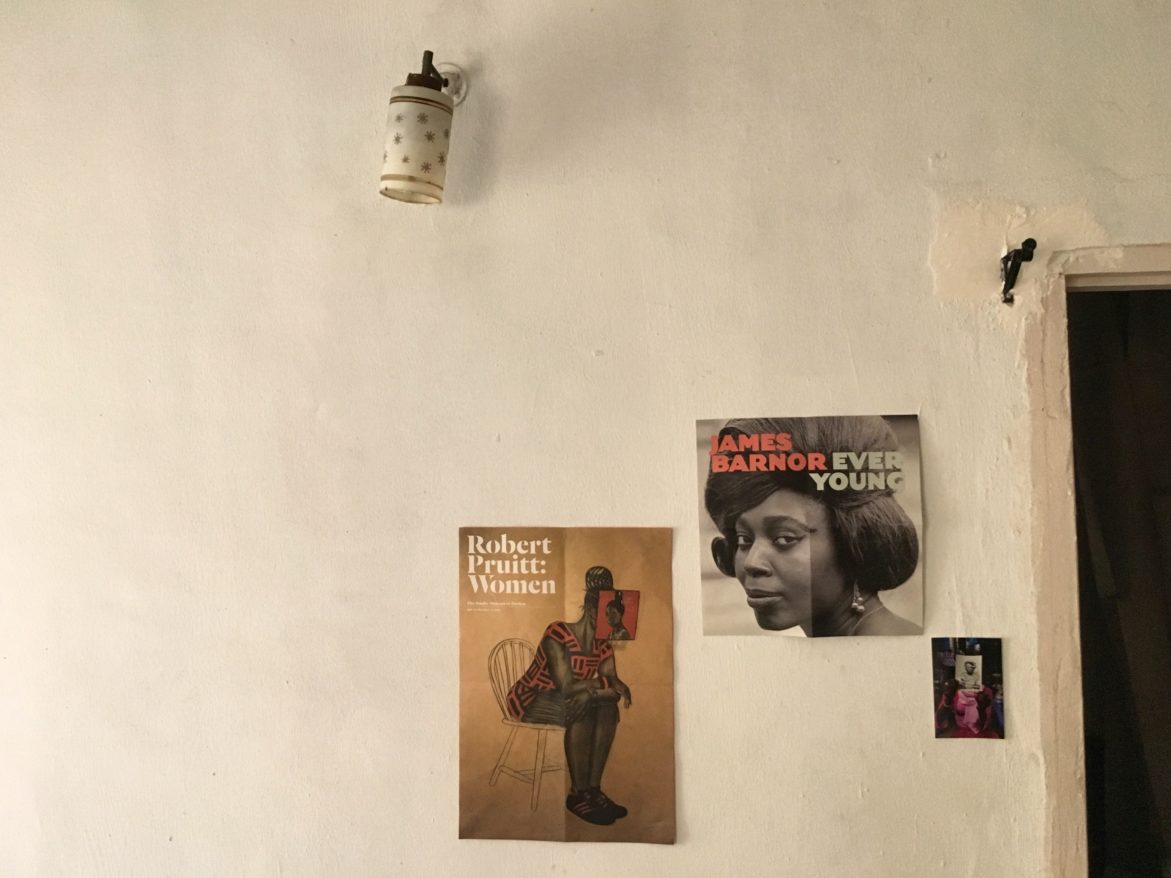
“Your house is kind of apocalyptic,” photographer Benedicte Kurzen said. “I like it.”
The whole house tilts at a 30-degree angle, like the edifice is peering over the gate into the neighbor’s yard. I was dizzy when I first visited. “Absolutely no way can we live here,” I told my flatmate. “It will destroy our posture.” But somehow I was convinced. First-time visitors joke about opening a skate park in the living room. By now, I barely notice. We had an engineer inspect the place. He said because the whole foundation is tilted, sinking into the soggy marshland, the building is structurally sound. I hope I believe him. All the houses in the neighborhood have their own skew. Also, buildings collapse in Lagos all the time.
The plumber fell through my ceiling one day. Repairing our aging pipes, he was one of a parade of workers who each fixed one thing and broke another. A carpenter followed the plumber. He evaluated the star-shaped negative space above us, then went to the market for supplies. He returned with panels that were wooly, grey, pliable, and obviously synthetic. “What is this?” I asked. “It’s the same as the rest of the ceiling,” he said, “You have to call a painter to come after and it will match.”
My flatmate is an architect, but she wasn’t home that day. When I asked her later, she was flippant. “Yes, it’s asbestos,” she said, “It’s not good, but that’s what they use in Nigeria…it’s fucked-up and toxic. But what should we do? Redo the complete ceiling?”
“I thought they banned it,” I said.
“Well I know it’s banned everywhere,” she said, “but I didn’t know about in Nigeria.”
I used to smoke, and I remember the transition from insouciance to anxiety. At first, the romance of smoking in cafés, in hammocks, on balconies drowned out everything else. But by the time I quit, every time I lit up, I would imagine the smoke moving directly to the tight spots between my shoulder blades. Whether it was mental or physical, the toxicity was too much. In relationships, toxicity rises like textured air between people, a misalignment or friction that slowly poisons everything. It comes from unspoken things, from tensions we hold in ourselves, consciously or not; from feelings we don’t voice, don’t release, don’t forgive. “It seemed a part of her body, which she had got accustomed to touching, had suddenly sprouted thorns and every effort made to touch that part merely resulted in bleeding,” Nigerian novelist Chigozie Obioma wrote on estrangement between a mother and child.
What do we do if our homes are toxic? I think of the slow deaths, sudden deaths, sooner deaths of poverty. It’s not just rampant use of asbestos. A study came out in 2016 showing that a city in Eastern Nigeria had the worst air pollution in the world. I jog in the mornings in the verdant colonial railway compound near my house. To get there, I cross a wide boulevard, skirting buses and trucks decorated with inspirational aphorisms, which belch fumes while I stretch. At parties, people comment on the counter-productivity of outdoor fitness in smoggy Lagos. It annoys me, but maybe that’s my own cocktail of defensiveness and denial.
A 2009 survey found that one hundred percent of paint samples tested in Nigeria contained dangerously high levels of lead. Waterborne diseases kill an estimated 130,000 children every year. The small “I better pass my neighbor” generators used by the poor were banned for their emissions, as they are known to cause cancer, carbon monoxide poisoning and sudden fires. A court case showed that Coca-Cola products in Nigeria contained “poisonous levels of Benzoic Acid and Sunset additives.” This was revealed when a Nigerian tried to export Fanta and Sprite to the UK, where regulators found the products unfit for human consumption. The Coca-Cola Company’s response to the accusations was that the soda was not intended for export.
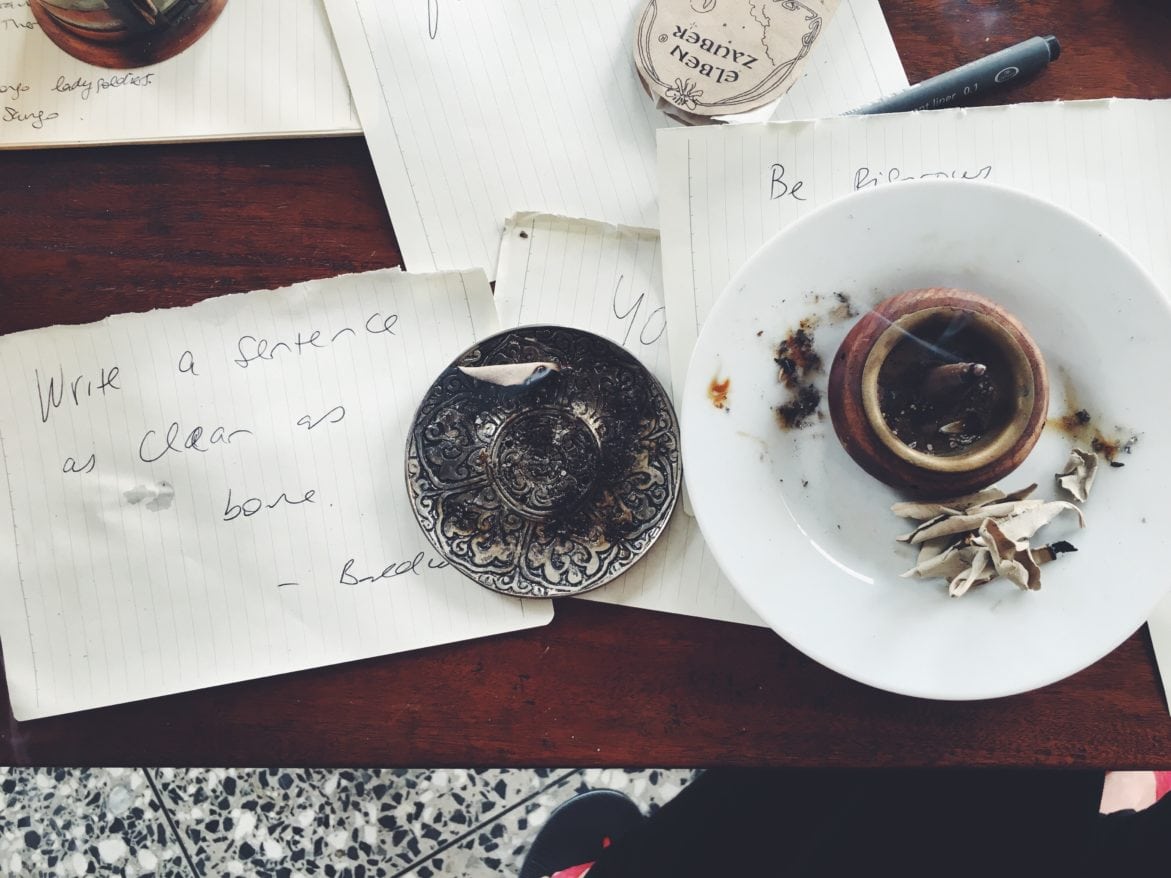
I choose to live here—very specifically here, in this neighborhood, in this building. The space you stay is the center of your world. It becomes the reference, the subconscious “normal.” Though writing is introspective, the space you are writing from—the space you are thinking from—still informs perspective. It is different to read the New York Times in Brooklyn than it is to read it in Yaba. I wanted to make my vantage point a middle class neighborhood in mainland Lagos, layered with history, populated by families. I chose a space where I don’t have guaranteed electricity. I like the reminder of consumption. I don’t mind when the power runs out and I choose not to use the generator, and instead light candles, meditate, go outside. I don’t mind the occasional bucket shower; I find it cozy. We move through and fill our homes, and our homes also subtly move through us. But my choice to live here is a privilege.
How do we live with the constant awareness that our lives are being shrunk? That our bodies are being polluted? These are generally long-term effects that don’t manifest right away. Most Lagosians are surviving, trying to stay above the constant assault of stress, the perpetual crisis that is poverty. So are the customs agents who accept bribes to let in banned materials. If our ceilings and walls, the air we breathe, and our energy sources are slowly poisoning us—inserting particles into the walls of our lungs—what do we do? “It’s too much to think about,” Taiye Idahor, a Nigerian artist, said. “You can’t even breathe.”
I think of denial, ignorance, and willful forgetting for people living in lethal quotidian environments. They say we repeat our traumas until we heal them. This cycle can be depressing: the crushing chronicity, the infinity loop, the scars that get deeper with each incision. But this also means we have endless opportunities to understand ourselves, our pain, and our histories in their relentless manifestations in our contemporary lives.
In the house I grew up in, toxicity was structural, embedded into the architecture of false and vacuous bonds. Silenced and invisibilized, like lead parts per million, it seeped into my fascia and bones anyway: subdermal rigidities from a childhood spent steeling myself against omnipresent, subtle violence. The poison was aggressively denied—in delusion or defense—but I felt it anyway, which is perhaps why I was a nomad for so long.
“I feel like I am living in a train station,” Abosede George, a historian and sometimes flatmate of mine, said.
I spent a lot of time in other people’s homes before I had my own: displaced peoples’ tents in Haiti, tin soldiers’ barracks in Congo, face-me-I-face-you tenement houses in Lagos. My projects have often been intimate, my interviews something between therapy and reporting. I was trained as a healer first—a doula, a yoga teacher, a domestic violence counselor, a harm reduction social work intern—so I know conversations and connections can be restorative, and I try to only report in a manner that feels as such. I remember how disconcerting it was, though, as I tucked myself into people’s families and lives, when they asked about my home life. Small talk prompted existential crises. “Where are you from?” was already an awkward question. Should I name the place I was born and raised and fled? If not, which home should I claim? Any one that I named felt partially false. These were questions with longform answers—sentences and paragraphs, not simple dialogue. They were also questions that hurt. Where is home, actually? Do I need one? I read, with relief, a text by Giles Mohan on temporary Chinese workers in Africa, that resisted the “sedentarist bias” which “assumes that people aspire to a fixed base in a particular locality…by seeing migration and mobility as constitutive of social transformation, we move away from viewing it as an aberration which needs to be managed.”
I had a temporary base in New York last year to heal a torn ligament. (Privilege is flying away when you get hurt.) I was in yet another uncertain romantic entanglement, and my friendships were in flux, and I needed to go somewhere I felt supported and connected. Plus, I couldn’t climb the stairs. So I flew to Brooklyn and filtered through three friends’ couches before I set up camp in a construction site. The loft was being remodeled to make a second bedroom. It was serendipitous that one of my favorite humans to live with was in search of a roommate; also that, at a point when I had been flying all year—trying and failing to find the time and space to sit down and process and write and think—I injured myself so badly I could not stand. As I sat on the couch in the shadowy interior, the contractor said to me, “You should go outside. It’s a beautiful day. Just at least walk to the park or something.” I felt him judging my stasis, my apparent stagnation, and was furious. Do you have any idea just how outside I have been? Just where I have walked? I fumed in my head. No. Now is the time for interiors.
And so I got what I wished for: six months to sit down. I was antsy the whole time, and at the four month mark I bounded off to Goma, where I wrote in my journal, Two beautiful homes and I am in neither.
“I love my home,” I told people in Paris, in Guangzhou. Nomadism is stability in motion. I remember, for years, feeling most grounded in airplanes. I liked the quiet, the excuse to be out of touch and outside of time.
As soon as I had a home, I made it a refuge for other wanderers. Temporary communes spring up when the right mix of people are in town. There is a spare room that we rent out short-term, mostly to researchers, artists, and journalists traipsing through the city. “Are you running a residency?” someone asked. “Kind of,” I laughed. Cohabiting is one of my favorite types of intimacy: the slow reveal, the release of the guard, the conversations that unspool over days. Interiors are the space for unfolding, for unmasking, for unveiling. We dress in our underwear and throw wrappers on when someone comes to the door.
The nomads leave traces, intentionally and not. The drama of folding months into a suitcase always ends in stress and spillage and overflow. Every transnational flyer in Nigeria is a small-scale importer. A departing tenant struggled to cram 6 bottles of spiritual oils and parcels of incense, bitter, and scent leaves into her luggage for her mother. The next day, a visitor arrived bearing organic olive and frankincense oils and sage leaves for me. I would not hang the Nollywood poster artist Francois Beaurain left; it’s not my taste, too bombastic. But I like that it is here, folded in the corner.
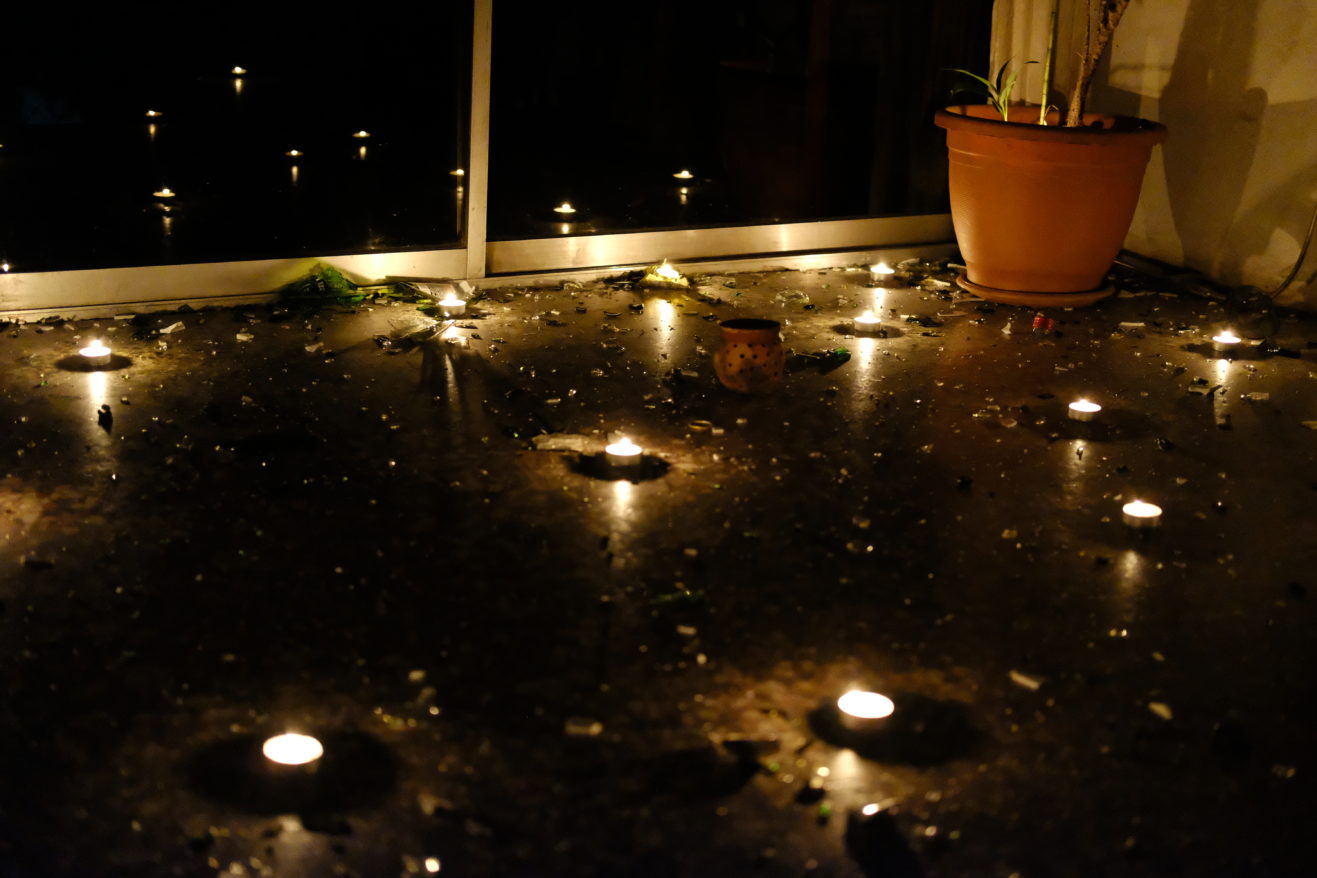
“One can and must write only of city labyrinths, the repositories of our complex and contradictory emotions,” Elena Ferrante wrote. “I recalled the image of the labyrinth as an ordinary space, a known place that, with oneself, is suddenly disrupted by a strong emotion.”
I walked one evening into the living room and found a new lover bent over my temporary flatmate, exploring his capacities for energetic healing touch. The rage of asymmetry, the possibility of betrayal, burnt my skin. They went for a beer and I threw bottle after bottle across the floor. The shattering was delicious, the physicalization of the profundity of feeling. Wear shoes when you throw glass, I wrote in my journal. When I finished, I lit candles, dripped the wax down my back, and burnt traditional purifying Yoruba incense. The shards glittered in my shrine to jealousy. It felt holy. He came back, we recovered, and in the morning I woke to him softly sweeping the space.
I fought with my flatmate to keep the living room wide open. It had to be clear so I can breathe, and to make space for everything that would happen here.The speckled terrazzo floor—beautiful slabs of concrete pressed with tile fragments—has a star in the center. I scoured the rental market to find one of these open older buildings, out of fashion now. New Nigerian constructions have small windows, air conditioning, and shiny iridescent enamel. Old places come in a state of utter disrepair: doors off hinges and disconnected toilets. My first night in the apartment—when the walls were unpainted, the light not yet connected, and I don’t know where my furniture was—I was fighting with my then-boyfriend, who told me not to come over. I rolled a plastic prayer mat out in the center of the floor, placed my slim guest mattress on top, and took miserable photographs of the haphazard potential. I woke to the sunrise blazing through the glass doors.
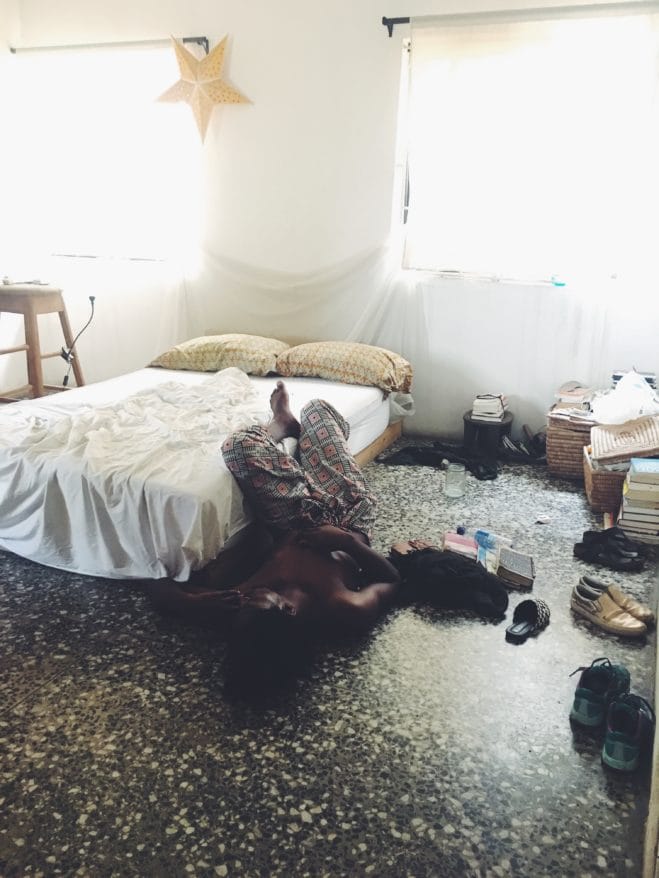
It was a revelation, my first year in Lagos, to learn that time passes even when you don’t move. Until then, I told time by location: January in Washington, March in Shenzhen, April in Paris. Now, time passes with the transience of those around me: the sound artist, the human rights lawyer, the filmmaker, the psychotherapist. I still leave for months at a time. I packed a carry-on for a weekend wedding in Dakar and stayed gone for three months, wandering through San Francisco and Berlin before meandering home again. Every return to Lagos is a new chapter, with new characters, new energies, new pathways, new scars, new normals. Home feels, for the first time, like a backdrop, a constant, a void space to fill with my evolution. A home, I am learning, is a repository for all of our selves.
I will miss it when I leave.
